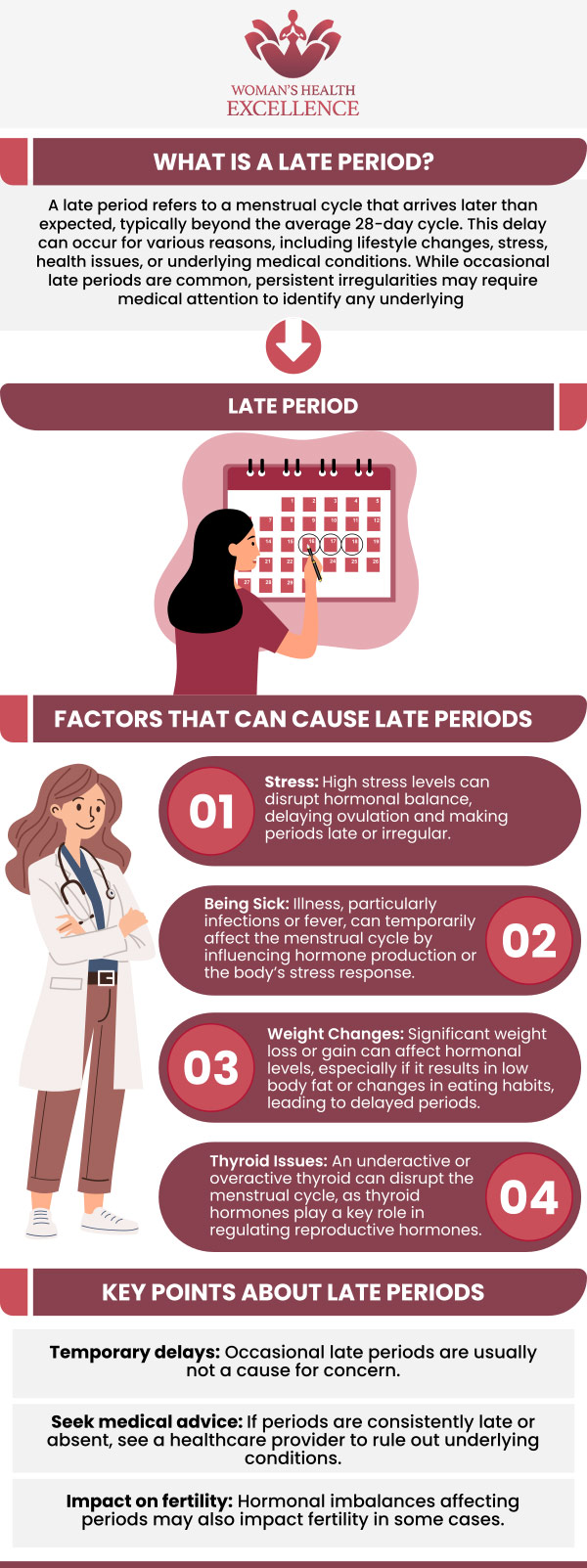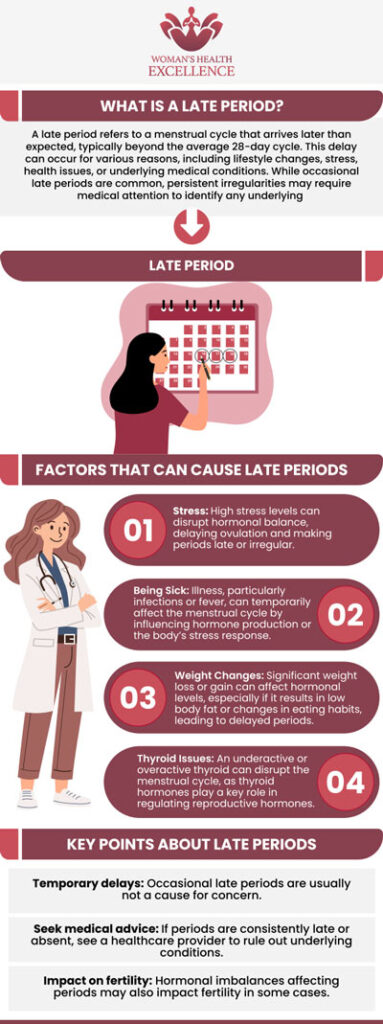When Your Period is Late by 10 Days: What Are the Possible Causes?
A late period can be concerning, especially if it’s delayed by 10 days. Several factors may contribute to this delay, including pregnancy, stress, or hormonal imbalances. Dr. Prema Kothandaraman at The OB-Gyn & Incontinence Center can help you understand the underlying reasons behind your missed period. Conditions like PCOS, thyroid issues, or changes in weight and exercise habits can also impact your menstrual cycle. For more information, contact us or book an appointment online. We have convenient locations to serve you in Arcadia CA and Glendale CA.


Table of Contents:
Is it normal for a period to be 10 days late?
Can PCOS cause a late period by 10 days?
Should I be worried if my period is late by 10 days, but I don’t have any other symptoms?
Can a 10-day late period be caused by a change in exercise routine?
For women experiencing late period stress, our center offers comprehensive evaluations to determine potential causes. Stress, significant weight changes, and intense physical activity are common factors that can disrupt menstrual regularity. Our experienced team can help identify these lifestyle influences and work with you to develop personalized strategies to restore balance.
Moreover, conditions such as polycystic ovary syndrome (PCOS) and thyroid dysfunction can significantly impact menstrual cycles. Our specialists are adept at diagnosing and managing these hormonal imbalances to help regulate your cycle and alleviate associated symptoms.
Additionally, for those considering the possibility of pregnancy, our center provides reliable testing and expert guidance to confirm and support your journey. Understanding that a delayed period can sometimes be an early sign of pregnancy, we prioritize timely and compassionate care.
At The OB-Gyn & Incontinence Center, we also recognize that menstrual irregularities might be linked to changes in birth control, illness, or travel. Our healthcare providers are available to discuss these factors and any concerns you may have.
While a single delayed period may not be alarming, recurrent issues or additional symptoms warrant professional evaluation. We are committed to helping you maintain optimal reproductive health through comprehensive care and informed decision-making. If you have concerns about your menstrual cycle, don’t hesitate to reach out to our dedicated team for expert advice and support.
One of the hallmark features of PCOS is irregular menstruation, which can present as infrequent, prolonged, or unpredictable periods. This irregularity often stems from hormonal imbalances, particularly elevated androgen levels, and insulin resistance, which can disrupt normal ovulatory cycles. At our center, we are committed to providing comprehensive care to individuals experiencing these symptoms, helping them understand and manage their condition effectively.
A late period, such as one delayed by 10 days, is a common experience for those with PCOS. This delay is typically due to anovulation, where the ovaries do not release an egg regularly, leading to skipped or delayed periods. Our healthcare professionals are equipped to evaluate and diagnose PCOS, using advanced diagnostic tools like ultrasound and blood tests to assess hormone levels and ovarian function.
Furthermore, factors such as insulin resistance, stress, weight fluctuations, and lifestyle changes can exacerbate menstrual irregularities in PCOS. At The OB-Gyn & Incontinence Center, we offer personalized management plans that may include lifestyle modifications, dietary guidance, and medical interventions to regulate menstrual cycles and address insulin resistance.
PCOS can lead to delayed periods due to hormonal imbalances and anovulation. At The OB-Gyn & Incontinence Center, we are here to help patients navigate these challenges, providing expert care and guidance to optimize their reproductive health and overall well-being.
If you have a late period of 10 days, the most common consideration is the possibility of pregnancy. We offer reliable pregnancy testing and consultations to help you understand your options and next steps, whether your test is positive or negative.
Beyond pregnancy, various factors can contribute to a delayed period, and our team is here to help identify and address them. Stress, whether emotional or physical, can significantly impact your menstrual cycle. Our healthcare providers can work with you to explore stress management techniques and lifestyle adjustments that may help regulate your cycle.
Hormonal imbalances, such as those seen in polycystic ovary syndrome (PCOS), thyroid disorders, or approaching menopause, can also affect your period. At The OB-Gyn & Incontinence Center, we offer diagnostic services and personalized treatment plans to manage these conditions effectively.
We recognize that factors like diet changes, travel, and sleep patterns can influence your menstrual health. Our holistic approach ensures that we consider all aspects of your lifestyle when assessing menstrual irregularities.
If you have recently stopped using hormonal contraceptives, it’s common for your cycle to take some time to stabilize. We can guide you through this transition and provide support to manage any concerns.
While occasional variations in your menstrual cycle are normal, persistent irregularities or symptoms such as severe pain or heavy bleeding should not be overlooked. Our experienced team is committed to providing the care and attention you need to address any underlying issues.
A delay in menstruation can be influenced by various factors, including changes in an exercise routine, which is particularly relevant for our patients who are navigating lifestyle adjustments. The menstrual cycle is regulated by a delicate balance of hormones, and significant lifestyle changes can disrupt this balance. Engaging in a new exercise routine, especially if it is more intense than usual, can lead to changes in the menstrual cycle. This is where our expertise in hormonal health can provide guidance and support.
At The OB-Gyn & Incontinence Center, we recognize that increased physical activity can alter energy balance and body composition, affecting hormone levels such as estrogen and progesterone. For some individuals, especially those experiencing rapid weight loss or maintaining a low body fat percentage, these hormonal shifts can be more pronounced, sometimes leading to exercise-induced amenorrhea. Our team can help assess these changes and offer personalized advice to manage them effectively.
Moreover, stress associated with a new workout routine can also contribute to delayed periods. Our approach considers the holistic impact of stress and lifestyle changes on menstrual health. We work with our patients to identify stressors and develop strategies to mitigate their effects on hormonal balance.
It’s also essential to evaluate other potential causes for menstrual delays, such as pregnancy, polycystic ovary syndrome (PCOS), thyroid issues, or changes in contraception.
If you are experiencing a delayed period or other concerning symptoms, we encourage you to consult with our healthcare providers. Our team is dedicated to providing compassionate care and expert guidance to help you manage your menstrual health and overall well-being.
If your period is consistently late, it’s important to seek professional guidance. Dr. Prema Kothandaraman at The OB-Gyn & Incontinence Center is here to provide a thorough evaluation and help determine the cause of your delayed period. Don’t wait—understanding your menstrual health is key to overall well-being. For more information, contact us or book an appointment online. We have convenient locations to serve you in Arcadia CA and Glendale CA. We serve patients from Arcadia CA, Glendale CA, Monrovia CA, Pasadena CA, Los Angeles CA, Burbank CA, and surrounding areas.


Additional Services You May Need
▸ Urogynecology
▸ Minimally Invasive Gynecology
▸ Monalisa & Medical Aesthetics
▸ Bioidentical Hormone Replacement Therapy
▸ Urinary Incontinence
▸ Pelvic Organ Prolapse
▸ Painful Bladder
▸ Urinary Tract Infection
▸ Genitourinary Syndrome of Menopause
▸ Female Sexual Dysfunction
▸ Urinary Retention
▸ Vaginal Laxity & Prolapse
▸ Postpartum Pelvic Floor Problems
▸ PCOD
▸ Bladder Prolapse Repair
▸ Urgent PC
▸ Fibroids
▸ Excessive Bleeding
▸ Pelvic Pain
▸ Birth Control & IUD
▸ Vaginal & Pelvic Infection
▸ Monalisa Touch
▸ STD
▸ TempsureVitalia
▸ Biote Pellet Therapy
▸ Topical BHRT
▸ Flexsure
▸ Rectal Prolapse Repair
▸ Tempsure ENVI
▸ Minimally Invasive Pelvic Surgery for Incontinence


